
"Ain't Nothing Like the Real Thing" is a 1968 single released by American R&B/soul duo Marvin Gaye and Tammi Terrell, on the Tamla label in 1968. The B-side of the single is "Little Ole Boy, Little Ole Girl" from the duo's United LP. The first release off the duo's second album: You're All I Need, the song—written and produced by regular Gaye/Terrell collaborators Ashford & Simpson—became a hit within weeks of release eventually peaking at number eight on the US Billboard Hot 100 and number one on the Hot Soul Singles chart, the first of the duo's two number-one R&B hits. In the UK "Ain't Nothing Like the Real Thing" reached number 34.

"Dream Weaver" is a song by the American singer Gary Wright, released as the first single from his third studio album The Dream Weaver in December 1975.

"Three Times a Lady" is a 1978 song by American soul group Commodores for their album Natural High, written by lead singer Lionel Richie. It was produced by James Anthony Carmichael and Commodores.
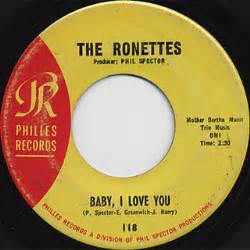
"Baby, I Love You" is a song originally recorded by the Ronettes in 1963 and released on their debut album Presenting the Fabulous Ronettes (1964). The song was written by Jeff Barry, Ellie Greenwich, and Phil Spector, and produced by Spector.

"How Deep Is Your Love" is a pop ballad written and recorded by the Bee Gees in 1977 and released as a single in September of that year. It was ultimately used as part of the soundtrack to the film Saturday Night Fever. It was a number-three hit in the United Kingdom and Australia. In the United States, it topped the Billboard Hot 100 on 25 December 1977 and stayed in the Top 10 for 17 weeks. It spent six weeks atop the US adult contemporary chart. It is listed at No. 27 on Billboard's All Time Top 100. Alongside "Stayin' Alive" and "Night Fever", it is one of the group's three tracks on the list. The song was covered by Take That for their 1996 Greatest Hits album, reaching No. 1 on the UK Singles Chart for three weeks.

"Lonely Boy" is an international hit song from 1977, written and recorded by Andrew Gold in 1976 for his album What's Wrong with This Picture? It spent five months on the American charts, peaking at number seven in both Canada and the United States, the latter for three consecutive weeks on June 11, 18 and 25, 1977, and number 11 in the United Kingdom. While "Lonely Boy" was Gold's biggest hit in the US, his "Never Let Her Slip Away" achieved greater success in the UK.

"Too Much, Too Little, Too Late" is a song performed by singers Johnny Mathis and Deniece Williams. Lyrics and music were arranged by Nat Kipner and John Vallins. The single was a comeback of sorts for Mathis as his last U.S. top 10 hit was 1963’s "What Will Mary Say" and his last U.S. #1 hit was 1957's "Chances Are."

"Beginnings" is a song written by Robert Lamm for the rock band Chicago Transit Authority and recorded for its debut album Chicago Transit Authority, released in 1969. The song is the band's second single, but failed to chart on its initial release.

"This Masquerade" is a song written by American singer and musician Leon Russell. It was originally recorded in 1972 by Russell for his album Carney and as a B-side for the album's hit single "Tight Rope". The song was then covered on Helen Reddy's 1972 album, I Am Woman. It was then recorded by American vocal duo, the Carpenters, for their 1973 album Now & Then and as the B-side of the Carpenters's single "Please Mr. Postman". Three years later, "This Masquerade" was recorded by American singer and guitarist George Benson, who released it on his 1976 album, Breezin'. Benson's version, featuring Jorge Dalto on piano, was released as a single and became the first big hit of his career.

"This Is It" is a song by American musician Kenny Loggins. It was released in 1979 as the lead single from his 1979 album Keep the Fire. It reached number 11 on the Billboard Hot 100 and number 17 on the Adult Contemporary chart. "This Is It" was also successful on the Hot Soul Singles chart, reaching number 19; it was one of two entries on this chart.

"I Just Want to Be Your Everything" is a song recorded by Andy Gibb, initially released in April 1977 by RSO Records as the first single from his debut album Flowing Rivers (1977). The song was written by Gibb's older brother Barry, and produced by Gibb-Galuten-Richardson. It reached number 1 on the Billboard Hot 100 for three weeks, starting on the week ending 30 July 1977, and again for the week ending 17 September 1977. It was Gibb's first single released in the United Kingdom and United States. His previous single, "Words and Music" was only released in Australia. It is ranked number 26 on Billboard's 55th anniversary All Time Top 100.
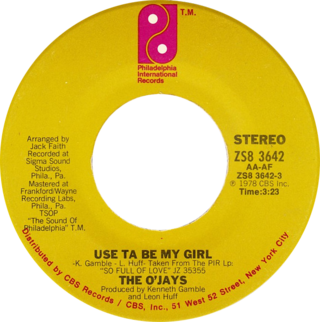
"Use ta Be My Girl" is a song by R&B vocal group The O'Jays. Released from their hit 1978 album, So Full of Love, it became a crossover hit. The song spent five weeks at number one on the R&B singles chart. It also peaked at number four on the Billboard Hot 100 singles chart. "Use ta Be My Girl" became one of the biggest and most familiar hits by The O'Jays. The song has also been certified by the RIAA as a million-seller.

"Everybody Plays the Fool" is a 1972 song first recorded by American R&B group The Main Ingredient, and written by J. R. Bailey, Rudy Clark and Ken Williams. It was the first single released from the group's album Bitter Sweet, released with the B-side "Who Can I Turn To ". "Everybody Plays the Fool" was the group's highest charting hit single, reaching No. 3 on the Billboard Hot 100 chart in the fall of 1972. It also peaked at No. 2 on the Billboard R&B chart and at No. 25 on the Billboard adult contemporary chart. It was certified gold by the RIAA.

"I Go Crazy" is a song written, composed, and recorded by American singer-songwriter Paul Davis. It was the first single released from his 1977 album Singer of Songs: Teller of Tales, and his second-highest peaking pop hit, peaking at #7 on the Billboard chart in 1978. The song entered the Hot 100 on August 27, 1977 and began slowly climbing, peaking in March and April 1978, before dropping off the chart the week after May 27, 1978. Overall, it spent 40 weeks on the Hot 100, setting what was then the record for the longest run on that chart.

"FM (No Static at All)" is a song by American jazz-rock band Steely Dan, the title theme for the 1978 film FM. It made the US Top 40 that year when released as a single, a success relative to the film. Musically, it is a complex jazz-rock composition driven by its bass, guitar and piano parts, typical of the band's sound from this period; its lyrics look askance at the album-oriented rock format of many FM radio stations at that time, in contrast to the film's celebration of that medium.
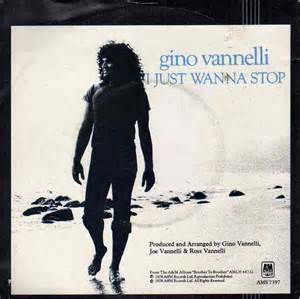
"I Just Wanna Stop" is a song by Canadian singer/songwriter Gino Vannelli. Released as a single in August 1978, it remains his biggest hit single to date, reaching No. 1 in his native Canada and No. 4 on the U.S. Billboard Hot 100. It appears on his sixth album, Brother to Brother. The recording was produced by Gino and his brothers, Joe and Ross Vannelli; the song was written by Ross. It received a nomination for Grammy Award for Best Male Pop Vocal Performance.

"Biggest Part of Me" is a song by American band Ambrosia, from the album One Eighty. Released as a single in 1980, the song reached number one on the Radio & Records chart and number 3 on both the US Billboard Hot 100 and Adult Contemporary charts. The song was written by band member David Pack. Pack re-recorded the song for his 2005 album, The Secret of Movin' On.
"All Your Fault" is a song recorded by American rapper Big Sean featuring fellow rap artist Kanye West, from Sean's third studio album Dark Sky Paradise. It contains samples from Ambrosia's 1978 song "How Much I Feel" and features additional vocals from Travis Scott.
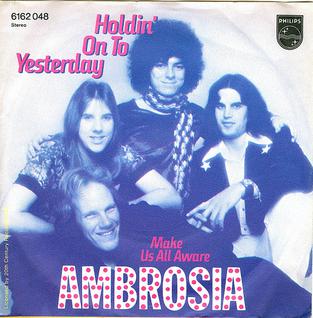
"Holdin' On to Yesterday" is the debut single by American rock band Ambrosia. It was written by David Pack and Joe Puerta.
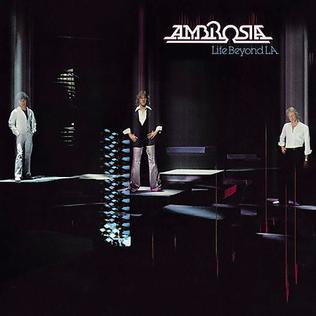
Life Beyond L.A. is the third album by Ambrosia, and their first album on Warner Bros. Records, released in 1978. It marked the departure of their progressive rock roots in favor of a more commercial jazz & soft rock sound. "How Much I Feel," "Life Beyond L.A." and "If Heaven Could Find Me" were released as singles.



















